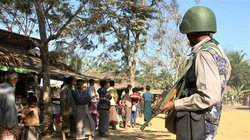 Myanmar’s government faces accusations of involvement in genocide regarding the persecuted Rohingya Muslims in a lawsuit filed by Gambia at the International Court of Justice (ICJ).
Myanmar’s government faces accusations of involvement in genocide regarding the persecuted Rohingya Muslims in a lawsuit filed by Gambia at the International Court of Justice (ICJ). RNA - During a press briefing on Monday, Gambia's Justice Minister Abubacarr Tambadou said his country was acting on behalf of the 57-nation Organization of Islamic Cooperation (OIC) in bringing the case against Myanmar before the ICJ in The Hague.
"The aim is to get Myanmar to account for its action against its own people: the Rohingya," he said, adding, "It is a shame for our generation that we do nothing while genocide is unfolding right under our own eyes."
In its 46-page filing to the ICJ, Gambia, a mainly Muslim West African country, says Myanmar’s actions were "genocidal in character" and caused serious bodily and mental harm. Myanmar also imposed measures to prevent births, it said.
According to Gambia's Justice Ministry, the lawsuit also asks the ICJ to "order Myanmar to cease and desist from its genocidal acts, to punish the perpetrators, and to provide reparations for the Rohingya victims."
It said Myanmar had failed to meet its obligations to prevent and to punish genocide, accusing it of "wanton acts of violence and malicious degradation with the specific intent of state actors to destroy the Rohingya as a group."
Tambadou is a former genocide prosecutor at the International Criminal Tribunal for Rwanda. He has visited Rohingya camps in Bangladesh.
Explaining why Gambia had taken the initiative, Tambadou said visiting Rohingya refugees at Cox's Bazar in southeastern Bangladesh had reminded him of his work as a prosecutor for the tribunal, which was set up to try those responsible for the 1994 genocide in Rwanda.
"I thought this was not right and the world cannot just stand by and watch this happen again," he said, adding the OIC had asked Gambia to look into how to bring Myanmar to justice over the matter.
Only a state can file a case against another state at the ICJ.
Both Gambia and Myanmar are signatories to the 1948 Genocide Convention, which compels all signatory states to prevent and punish the crime of genocide.
The law firm helping Gambia said it expected the first hearings on the provisional measures to take place next month.
While the ICJ has no means to enforce any of its rulings, going against the decisions of the court could further harm Myanmar's reputation.
The move by Gambia has drawn praise from human rights groups and Rohingya activists.
Yasmin Ullah, a Rohingya advocate, told a news conference in The Hague after the case was announced that "this is monumental for the Rohingya community who have endured so much."
"A court's characterization of our experience as genocide is long overdue," she added, calling on other nations to join Gambia in the ICJ lawsuit.
Param-Preet Singh, associate director of Human Rights Watch's international justice program, also welcomed the move. "Gambia has found a way to turn the international community's handwringing over the Rohingya into action."
The number of refugees at overcrowded camps in Cox’s Bazar has swelled since August 2017, when a military-led crackdown in Myanmar, which UN investigators have said was conducted with “genocidal intent,” prompted some 740,000 Rohingya to flee to Bangladesh, which was already hosting some 200,000 Rohingya when the exodus began.
Citizenship is at the heart of Rohingya demands for a return to Myanmar.
The Rohingya have inhabited Rakhine state for centuries, but the state denies them citizenship. Bangladesh refuses to grant them citizenship, too.
847/940